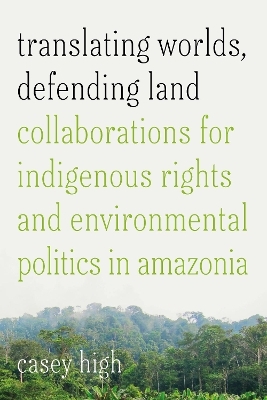
Translating Worlds, Defending Land
Collaborations for Indigenous Rights and Environmental Politics in Amazonia
Seiten
2025
Stanford University Press (Verlag)
978-1-5036-4146-4 (ISBN)
Stanford University Press (Verlag)
978-1-5036-4146-4 (ISBN)
- Noch nicht erschienen (ca. Februar 2025)
- Portofrei ab CHF 40
- Auch auf Rechnung
- Artikel merken
In 2019, after decades of ecological damage from oil, Waorani people took to the streets of Amazonian Ecuador to protest drilling on their ancestral lands. Working with international activists, lawyers, and other Indigenous groups, they successfully sued the government for selling oil concessions without prior consent. Placing their struggle for territorial autonomy in the global spotlight, this unprecedented legal victory for environmental rights by an Indigenous people reflected the new forms of collaboration emerging in contemporary Amazonia. Translating Worlds, Defending Land explores how Waorani collaborations, whether with environmentalists or academic researchers, bring about new possibilities, challenges, and imaginative horizons.
Based on fieldwork over a period of twenty-five years, Casey High interrogates what these engagements mean for Indigenous communities and how they offer critical reflection on collaboration as a concept, method, and practice. The alliances, misunderstandings, and conflicts that emerge in these contexts challenge the assumption that productive collaborations reflect—or require—shared purposes, generating important implications for an engaged anthropology open to reconsidering what constitutes ethnographic knowledge and who it is for. As some young Waorani adults become not just community leaders or environmental citizens, but also skilled researchers and ethnographers, translating between Indigenous understandings of land and the Western language conservation, they create a powerful new voice in international environmental politics.
Based on fieldwork over a period of twenty-five years, Casey High interrogates what these engagements mean for Indigenous communities and how they offer critical reflection on collaboration as a concept, method, and practice. The alliances, misunderstandings, and conflicts that emerge in these contexts challenge the assumption that productive collaborations reflect—or require—shared purposes, generating important implications for an engaged anthropology open to reconsidering what constitutes ethnographic knowledge and who it is for. As some young Waorani adults become not just community leaders or environmental citizens, but also skilled researchers and ethnographers, translating between Indigenous understandings of land and the Western language conservation, they create a powerful new voice in international environmental politics.
Casey High is Senior Lecturer in Social Anthropology at the University of Edinburgh. He is the author of Victims and Warriors: Violence, History and Memory in Amazonia (2015).
| Erscheint lt. Verlag | 18.2.2025 |
|---|---|
| Zusatzinfo | 15 halftones, 1 map |
| Verlagsort | Palo Alto |
| Sprache | englisch |
| Maße | 152 x 229 mm |
| Themenwelt | Naturwissenschaften ► Biologie ► Ökologie / Naturschutz |
| Sozialwissenschaften ► Ethnologie | |
| Sozialwissenschaften ► Soziologie | |
| ISBN-10 | 1-5036-4146-5 / 1503641465 |
| ISBN-13 | 978-1-5036-4146-4 / 9781503641464 |
| Zustand | Neuware |
| Haben Sie eine Frage zum Produkt? |
Mehr entdecken
aus dem Bereich
aus dem Bereich


